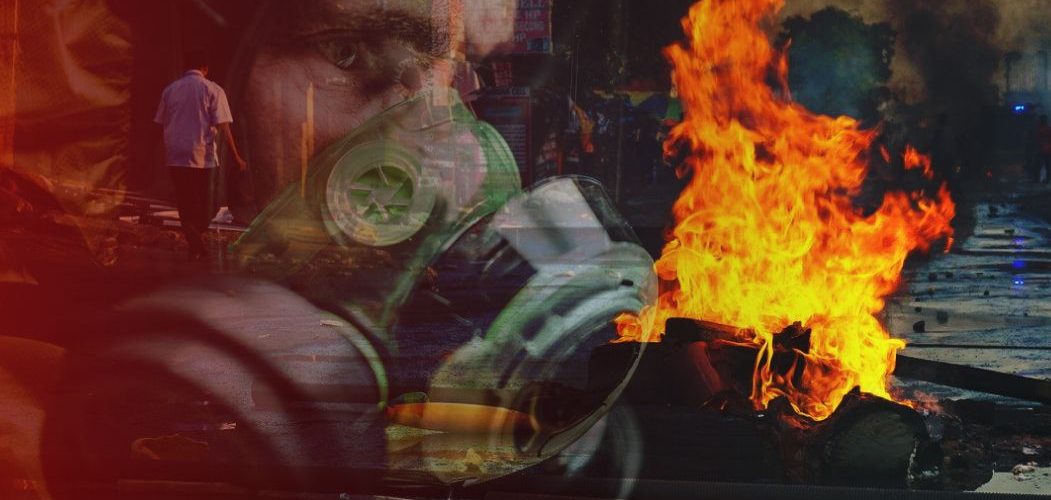Protests turned violent in Lebanon over the weekend in the most recent flare up for the nationwide crisis.
According to reports, gatherings of hundreds took place in cities around the country to protest the government’s response to Lebanon’s severe economic downturn. In several locations, demonstrators hurled rock and Molotov cocktails at security forces who responded with tear gas rubber bullets. At least 120 were injured in Tripoli alone with dozens of additional cases reported in other cities including the capital Beirut.
Meanwhile authorities have taken a stronger tone with protesters vowing to meet force with force and arrest those who confront security forces. In a statement released by Prime Minister Hassan Diab, the Lebanese leader condemned acts of “sabotage” committed by “thugs” in Beirut and Tripoli. “Thugs have no other motive than vandalism, and they should be thrown in jail,” read the statement.
The recent violence is only the resurgence of months long civil unrest that has been plaguing the country. While the COVID-19 pandemic may have put things on hold, the Lebanese have been out in the streets protesting their government since late last year.
To be sure, Lebanon itself does bear the main responsibility for its economic predicament. For years, institutional corruption and inept monetary policies have been sucking the country’s resources dry. The country’s economy took a steep dive in late 2019 as the Lebanese pound began to tank. This dealt a severe blow to Lebanon’s import-based supply chain. The collapse led to scarcity in many basic goods and cast almost half of the population into poverty. The global economic collapse triggered by COVID-19 only made matters worse. By March 2020 Lebanon’s currency was worth only sixty percent of its value from five months earlier. Three months ago, the Lebanes began to default for the first time in their history on billions in debts to international creditors.
The sheer magnitude of the crisis forces leaders to seek emergency aid from the International Monetary Fund (IMF) in April. By mid-May, the government was engaged in talks with the IMF for a $10 billion aid package. At last there seemed to be a light at the end of the tunnel. But the government faced a not-so-simple obstacle to procuring the IMF money.
Hezbollah, the Shiite terrorist organization which constitutes nearly ten percent of Lebanon’s parliament has persistently blocked IMF assistance. This is due to the simple reason that money from the fund always comes with strings–namely, political and governmental reforms.
The militant group controls many important aspects of Lebanese governance such as access through much of its borders (including the all important eastern front with Syria) and vital institutions such as the Health Ministry. The corruption and bad practices used by Hezbollah are to manage these assets are widely recognized as one of the primary reasons as to why Lebanon has sunk so low. Indeed Hezbollah would be forced under the IMF plan to alter many of its operating models. Why is Hezbollah so resistant to changing its ways? It is not so much that Hezbollah is bent on running Lebanon into the ground, rather it’s that national vitality and growth are simply not their first priorities. Hezbollah sees itself first and foremost as an arm of the Shiite Islamic Revolution, the religio-political movement that wrested control of Iran in 1979. While Hezbollah may very well like to see its fellow citizens thrive, its primary objective is to use the assets of the Lebanese state to further the goals of the Revolution. For instance, Hezbollah uses its control of the borders to manage smuggling rings that ensure groups loyal to the Assad government (also a Shiite regime) remain well equipped. For this reason, avoiding reforms is a very important part of Hezbollah’s strategy. But now, with conditions in Lebanon deteriorating by the day, even Hezbollah has been signaling its willingness to accept IMF aid. The sudden change of heart is due to the drastically deteriorating state of Hezbollah’s patrons in Tehran. In the past, the Shiite group was able to subsidize its operations in Lebanon with funds from the Ayatollahs. After two years of intense American sanctions however, the Iranian economy is in shambles. The Mullahs have slashed budgets across the board which includes support for its foreign proxies. With a strangled economy, rock-bottom oil prices, and still reeling from Corona devastation, Iran is in no position to foot Hezbollah’s bill.
The inability of Iran to exert influence in the region was always the primary motivation for the current U.S. administration’s hardline stance on the regime. As Lebanon descends deeper and deeper into crisis, there is increasing recognition across Lebanese society that Hezbollah is a major part of the problem. Lack of Iranian patronage and the resulting weakness of Hezbollah in the country may be exactly what’s needed to allow sweeping political change. Such an event could constitute a major blow to one of the Shiite axis’s most important strategic footholds.

















